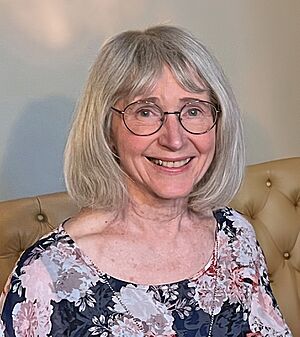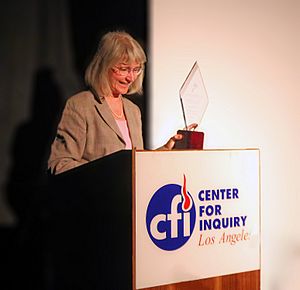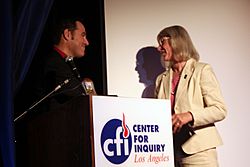Eugenie Scott facts for kids
Quick facts for kids
Eugenie Scott
|
|
|---|---|

Scott in 2022
|
|
| Born | October 24, 1945 |
| Education | University of Wisconsin–Milwaukee (BS, MS) University of Missouri (PhD) |
| Occupation | National Center for Science Education Advisor |
| Awards | Public Welfare Medal (2010), Richard Dawkins Award (2012) |
Eugenie Carol Scott (born October 24, 1945) is an American scientist who has worked to support the teaching of evolution in schools. She is a physical anthropologist, a scientist who studies how humans have developed over time.
Scott is known for speaking out against teaching ideas like young Earth creationism and intelligent design in science classes. She believed these ideas are based on religion, not science. She also came up with the term "Gish gallop". This describes a debate tactic where someone throws out many weak arguments at once. The goal is to overwhelm their opponent so they can't respond to everything.
For many years, from 1986 to 2014, Scott was the leader of the National Center for Science Education (NCSE). The NCSE is a group that helps teachers and schools teach evolution accurately. Today, she is still an advisor for the group.
Contents
Early Life and Education
Eugenie Scott grew up in Wisconsin. She became interested in anthropology, the study of human societies and their development, after reading her sister's textbook.
She went to college at the University of Wisconsin–Milwaukee and later earned her PhD (a high-level university degree) from the University of Missouri. In 1974, she started working as a physical anthropologist at the University of Kentucky.
A key moment for Scott was watching a debate between her professor and a creationist named Duane Gish. This experience made her passionate about the creation–evolution controversy, which is the public debate over teaching evolution in schools.
Career in Science Education
In 1980, Scott helped stop a plan to teach creationism in public schools in Lexington, Kentucky. Her work led her to become the executive director of the National Center for Science Education (NCSE) in 1987.
That same year, the U.S. Supreme Court made an important ruling in a case called Edwards v. Aguillard. The court decided that it was against the law for public schools to be forced to teach creation science. Scott led the NCSE for 27 years, retiring in 2014.
Beliefs and Views
Scott was raised in a liberal Protestant family. Today, she is a secular humanist. This means she believes in using reason and science to solve human problems, without relying on religious beliefs. She has described herself as a nontheist, which means she does not believe in a god.
Books and Writing
Scott has written a lot about the debate between evolution and creationism. Her book, Evolution vs. Creationism: An Introduction, explains the main arguments from both sides. It helps readers understand the scientific evidence for evolution and why ideas like creationism are not considered science.
She also co-edited a book called Not in Our Classrooms: Why Intelligent Design is Wrong for Our Schools. This book explains why many scientists and educators believe that intelligent design should not be taught in science classes.
Major Court Case: Kitzmiller v. Dover
In 2005, Scott played an important role in a famous court case called Kitzmiller v. Dover Area School District. A school district in Dover, Pennsylvania, had decided to teach intelligent design in its biology classes. A group of parents sued the school district to stop this.
Scott and her team at the NCSE acted as expert advisors for the parents. They provided scientific information to help the lawyers argue their case. The judge, John E. Jones III, ruled that intelligent design was a religious idea, not a scientific one. He said that teaching it in public school science classes was unconstitutional. Scott was very happy with the result, saying, "we won decisively."
Awards and Recognition
Eugenie Scott has received many awards for her work in defending science education. Over her career, she has been given ten honorary degrees from universities in the United States and Canada.
Some of her most important awards include:
- Public Service Award (2001) from the Geological Society of America.
- National Science Board Public Service Award (2002) for helping the public understand science.
- Scientific Freedom and Responsibility Award (2007) from the American Association for the Advancement of Science.
- The Stephen J Gould Prize (2009) for helping the public understand evolution.
- The Public Welfare Medal (2010) from the U.S. National Academy of Sciences, one of the highest honors for a scientist.
- The Richard Dawkins Award (2012) for raising public awareness of atheism.
Media and Public Life
Scott has often appeared in the media to talk about science and evolution. She has been interviewed for magazines like Scientific American and has appeared on TV shows to debate supporters of creationism.
In 2004, she was on an episode of the TV show Penn & Teller: ...! called "Creationism." On the show, she explained the scientific viewpoint on the topic. She sees her role as a defender of science, once calling herself "Darwin's golden retriever."
Personal Life
Scott lives in Berkeley, California, with her husband, Thomas C. Sager. They have one daughter.
Besides her work in science, Scott has an interesting hobby: she is a backyard beekeeper. She keeps two beehives and is interested in the health of bee populations.
See also
 In Spanish: Eugenie Scott para niños
In Spanish: Eugenie Scott para niños
 | Sharif Bey |
 | Hale Woodruff |
 | Richmond Barthé |
 | Purvis Young |



